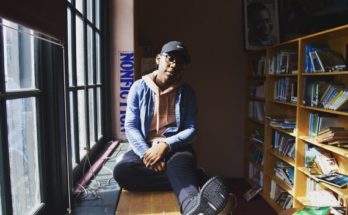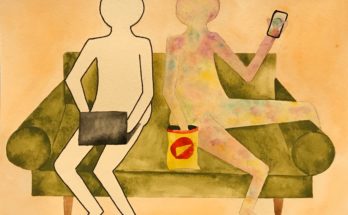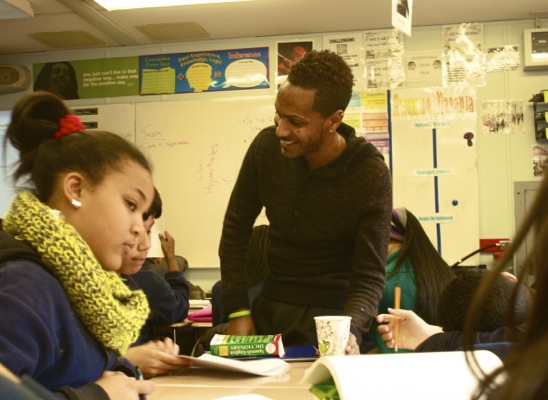
Sixth-grade math is a noisy affair at The Equity Project Charter School (TEP). A quiz is underway in Trailer 17, one of 15 bright red trailers that serve as classrooms on TEP’s Washington Heights campus.
The teacher, 24-year-old Kadeem Gill, whips out a blue card that says “6×6.” “Thirty six!” screams someone, echoed by a medley of voices and cheers. The kids, dressed in red and blue shirts, break into a dance, their bodies wiggling in excitement. Gill’s expectant smiles turn into grins and then laughter in response to his students’ enthusiasm.
Gill doesn’t refer to them as students. “Student suggests a subordinate relationship, an empty vessel that you need to pour information into,” he said. He prefers the word “scholar” because it implies a partner: “I want to have a conversation in every class.” The word is commonly used by charter schools but when Gill heard it, he said, “I thought that’s my word and I just kind of clung to it.”
Gill is lean and stylish: his crisp, collared shirts are always tucked in, often under vests, and his hair is perfectly gelled. When he started teaching at TEP eight months ago, he thought it would be a temporary stop before law school. Gill has wanted to be a lawyer for as long as he can remember. In fact, he decided he did not want to be one only a few weeks ago, when his offer of admission from Columbia University’s law school was about to expire. All his life, Gill wanted to grow up to be rich and successful. He wanted financial security, he said, because he was brought up by a single mother and rarely saw his father. He wanted to get away, he said, because he hated where he lived in Bedford-Stuyvesant – a short walk from three different public housing projects. He did get away. But then he came back. He decided to give up law school to teach children who, he said, remind him of his difficult childhood.
Gill is a not a typical urban teacher. He is a gay, half African-American and half Puerto Rican graduate of Princeton University. Nearly half the children in U.S. public schools are black or Hispanic but more than 85 per cent of the teachers are white. Gill was the only one of three brothers to graduate from high school. Even those black and Hispanic students who graduate with a 3.5 and above GPA aren’t as likely to make it to the country’s top 400 schools as their white counterparts, according to a 2103 study by Georgetown University.
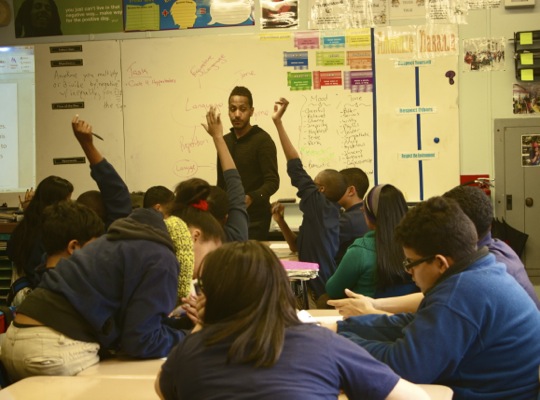
Gill beat the odds not just because he is smart, driven and hard-working. He also went to the right schools. First he cracked the test that earned him a spot at the Phillipa Schuyler Middle School for then Gifted and Talented in Brooklyn. Then he got a scholarship to attend an exclusive boarding school. There was always someone rooting for him. Maggie Castillo, his mother’s best friend and his godmother, urged him to take the test to go to Phillipa Schuyler. While he was there, his social studies teacher helped him apply to a preparatory program that eventually helped him get into The Hotchkiss School in Connecticut.
Gill said he didn’t fit in with the kids who lived down the street from him or those he went to elementary school with because he was a serious kid who loved studying. “If I forgot his books at grandma’s and we went home without them, he would cry,” said Mickey Ruiz, Gill’s mother. “He would cry if he couldn’t do his homework.” She remembers him as a responsible boy who was finicky about every little thing. He grew up so fast, Ruiz said, that even as a kid, he felt like a partner in the household and she often relied on his “maturity.”
When he got to Hotchkiss, Gill felt even more like a misfit. “It was a reality check for me because even those handful of black kids were rich,” he said. He was still picked on because he was different. When he had milk thrown on him, he reacted the way he would have in the “projects.” “I took that same hyper vigilance and I brought it to Hotchkiss… just out of instinct,” he said. And he was told by his classmates who were black that he was being too “ghetto.”
“They didn’t know my life,” he said, the life he came back to every summer.
His younger brother, Jonathan, barely attended school and their mother was struggling with him at home. Jonathan was in a special needs class because of severe behavioral problems. “They just didn’t know how to help him,” said Gill. “He didn’t have trouble keeping up in class but he had emotional issues. But they treated him like he had a learning disability.” As Jonathan grew older, Ruiz found it harder to get him to take his medication or go to school. She couldn’t afford counseling. When he did go to school, he often got into trouble for acting up in class, kicking down doors, even lashing out at teachers. His outbursts alarmed Ruiz, who remembered locking her door at night. “I just didn’t know how to help him,” she said. “There was nothing nobody could do for me.”
Ruiz was 19 when she had Kadeem. Four years later, she started taking care of her cousin’s three-month old baby, Jonathan. When he was four years old, she legally adopted him. “His mother started to visit less and less,” said Ruiz, who had agreed to help her cousin’s girlfriend take care of the baby to give the couple a “break.” They had other children and a volatile relationship.
Jonathan and Kadeem were close growing up. “We were always together,” said Gill. “He would cry every time I went to visit my father’s mother in Virginia.” When Gill left for Connecticut, Ruiz said, Jonathan didn’t take it well. His behavior got worse and so did his relationship with Ruiz.
Gill’s summer breaks were tumultuous – helping his mother manage his brother’s behavior, dealing with Jonathan himself, evading gangs and violence that was a regular part of his neighborhood. When his classmates went home for the break, they traveled abroad. When Gill came home, he would find out that one of his cousins was stabbed or another one of them was robbed.
He would go back to school and everyone but him would be refreshed. He was drained from everything that had gone on at home. But when he was asked about his break, he lied. “I am not going to tell them that I went for a break and I was jumped by two Bloods and that’s why I have stitches in my mouth,” said Gill.
Instead, he told them he busted his mouth while skateboarding.
Although he hated Hotchkiss, Gill said, the school changed his life. He went from there to Princeton on a full scholarship, majoring in psychology. While he was at Princeton, his half-brother, Danny, was shot and killed. Danny was the first person Gill had come out to. “Losing him was like losing my base,” he said, “I was never angry. I was so sad and disappointed.”
That was when Gill started to doubt law as a career because he wasn’t sure he even wanted to see the two men who killed Danny go to prison. “I knew them,” he said. “I knew their lives.” Danny had often told Gill that he would make a great teacher. At Princeton, Gill started teaching reformed drug addicts recently released from prison to take the GED. After he graduated, he applied and got accepted to become a Teach for America corps member. Gill was assigned to the Jonas Bronck Academy in the Bronx to teach math. During Jonas Bronck’s summer break, he taught integrated algebra in Spanish at the Bronx Bridges High School . While he was a TFA fellow, he also got a masters in adolescent special education from Hunter College.
When he started teaching, Gill said, it wasn’t Danny that he kept thinking of but Jonathan. That’s what drove him towards special education. “My brother was just looking to win,” said Gill. “He was asked to comply so much, he started to break the rules.” Gill remembers going with his mother to so many special education meetings. His mother would often leave without understanding what was going on because no one could explain it to her. Jonathan dropped out of school when he was 16 years old. He had already moved out of his mother’s house and was living with his girlfriend.
“The school system failed him,” said Gill. As a teacher, he wants to change that. He wants to “dig and dig to find out what it takes to reach each kid.” But he said it’s not easy because he identifies with his students. “I see an aspect of my brother in all these kids,” said Gill. “I see my mother in the parents. I even see myself in some of the kids.”
At TEP, there are no separate classes for children with special needs. So teachers are expected to work closely with them in every class. Gill is particularly attentive. After the quiz, the “scholars” are divided into groups that work together to crack problems. As Gill watches, one of the boys, Roniel, stalks away from his group. Gill walks over to him, speaks to him quietly and the two of them step out of the classroom. Work continues under Gill’s co-teacher Harris Brown. Since more than half of Gill’s class is special needs, a co-teacher is legally mandated.
Ten minutes later, Gill and Roniel come back into the room. It turns out Roniel had refused help from his classmate, Ruddy, who was in the group with him. So Ruddy said, “Whatever, you can’t do this work anyway,” referring to Roniel’s special needs status. Gill used what he calls a “de-escalation” strategy to calm down Roniel, who started to cry when they stepped out of the trailer. He made him take a couple of deep breaths and then asked him what had happened in the classroom. When Roniel told him, Gill asked him to name a dish he didn’t like. “School lunch,” said the boy. “No, school lunch tastes great,” said Gill. Teacher and “scholar” argued for a few minutes and then, Gill said, “Have I been able to change your mind about school lunch?” Roniel said no. “Then no one should be able to change your mind about your abilities and your potential,” Gill said. He told Roniel he should defend himself as well as he had defended his dislike for school lunch. And if something like this happened again, he should raise his hand, so Gill could step in immediately. The two hugged and went back into the classroom.
Gill works this closely with most of his students. Nayeli, also a sixth-grader with special needs, uses Gill’s phone to call her mother. “I have her on speed dial,” he said. Gill says that Gilbert, a seventh-grader with special needs, reminds him the most of his brother Jonathan. “Gilbert has trouble sitting still and becomes very frustrated by challenging tasks,” said Gill. “But he is also very sensitive and compassionate.” All these traits remind Gill of Jonathan.
“Gilbert is a hold-over,” said Gill. “This is his second time in 7th grade, which is why I initially took the role of his mentor. I’ve been working with him to help him increase his grades and also to manage his behavior by reflecting on his self-control strategies.” Gill has even visited Gilbert’s house to tell the boy’s father how he can help him at home.
“He pops up,” is how Gilbert describes Gill. By that he means Gill is “different than other teachers.”
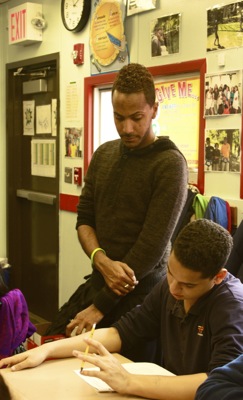
Until recently, Jonathan had no idea that his troubled school life was the reason Gill was so committed to students with special needs. “I didn’t know whether I should be flattered or what,” he said. He remembered being angry a lot as a child, and teachers would often respond by asking him to leave the classroom. “I would have preferred it if somebody pulled me to the side and told me one-on-one,” he said. “Not call me out in the middle of class.” Jonathan said he can relate to some of Gill’s students because Gill talks about them a lot or shows him their schoolwork. “He tells me what he does to help them and sometimes I give him a couple of ideas,” Jonathan said.
Gill is always open to trying something new. When he had to assign an essay topic to the seventh graders, he chose “Monsters” as the theme. The “reading:” “The monster” by Eminem and Rihanna. “Poetry” is the term Gill used. The results, he said, were impressive. One 13-year-old boy wrote that monsters are our own “hidden fears” while another wrote they are those aspects of ourselves that we don’t like but often see in others.
Gill loves teaching but he often wonders if this is a sustainable career? Teachers at TEP work 15 to 17 hours a day, he said, but they get paid well. Gill earns $75,000 a year as an apprentice, a first-year teacher awaiting a raise. If he gets it, he will earn $125,000 a year.
The school is still growing, he said, so teachers juggle several tasks inside and outside the classroom. “That’s what makes the job very exciting,” he said, “but that’s also what makes the job very tiring.”
As the math class wraps up, Gill tells his students, he has a surprise for them – a song. The kids cheer and clap as Gill launches into Usher’s “U Got It Bad.” That’s right. Usher. It was Valentine’s Day and the last day before TEP’s spring break.
The “scholars” start filing out in neat rows. Some of them hug Gill and Brown, and said they will miss them. One of the boys, Ruddy, returns to the classroom to get something out of his desk. “Did you come back to hug us?” Gill asked him. “No,” scoffed the boy. Gill and Brown, laughing, surround him in a bear hug as Ruddy giggles and tries to get away.
“I love my kids,” said Gill. He cares about them so much that he doesn’t mind being back home, living with his mother, and constantly being reminded of the childhood he always wanted to forget.
“That I am back where I started is painful and also fulfilling at the same time,” he said.

